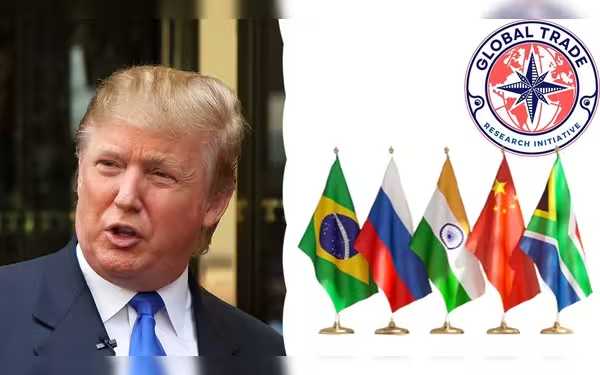Saturday, December 21, 2024 05:20 PM
GTRI Warns Against 100% Tariffs on BRICS Countries
- 100% tariffs could raise prices for American consumers.
- GTRI advocates for a balanced approach to trade.
- Retaliatory measures may worsen global trade dynamics.
 Image Credits: menafn
Image Credits: menafnGTRI warns that 100% tariffs on BRICS could harm American consumers and disrupt global trade.
The recent discussions surrounding the potential imposition of 100 per cent customs duties on BRICS countries have stirred significant debate in the economic landscape. President-elect Donald Trump’s remarks about these tariffs have raised eyebrows, prompting a closer examination of their implications. The Global Trade Research Institute (GTRI), a well-respected think tank, has stepped forward to challenge this notion, arguing that such drastic measures would not only be impractical but would also backfire on American consumers.
According to GTRI, the idea of imposing extreme tariffs is more of a symbolic gesture than a feasible solution. They warn that such actions could severely disrupt global trade dynamics. If the United States were to implement these tariffs, it could lead to a sharp increase in import prices, making everyday goods more expensive for American families. Furthermore, this could provoke retaliatory measures from other countries, which would only exacerbate the situation.
The think tank suggests that instead of taking a confrontational stance, countries like India should focus on creating a transparent and functional local currency trading system. This approach would not only stabilize their economies but also reduce reliance on the US dollar. GTRI points out that the historical tendency of the United States to leverage its financial influence—such as its control over international payment systems like SWIFT—has inadvertently encouraged other nations to seek alternative currency arrangements.
Experts from GTRI emphasize that no single nation, including the United States, can dictate global economic policies without facing significant backlash from the international community. They advocate for a balanced approach, particularly for India, which should aim to avoid total dependence on the US dollar while also steering clear of a complete shift towards a BRICS currency.
This nuanced perspective on international monetary policy highlights the complexity of global economic interactions. The GTRI’s analysis suggests that fostering diplomatic and economic engagement, rather than resorting to unilateral threats, would be a more effective strategy for addressing international monetary challenges. Such an approach would not only help maintain stable global trade relations but also ensure that American consumers are not left bearing the brunt of misguided economic policies.
The discussion around tariffs and currency dynamics is not just about numbers and policies; it is about the real impact on people's lives. As nations navigate these complex waters, it is crucial to prioritize cooperation and understanding over confrontation. The future of global trade depends on the ability of countries to work together, ensuring that economic growth benefits everyone involved.













